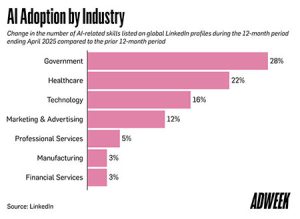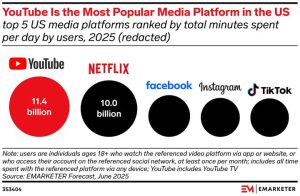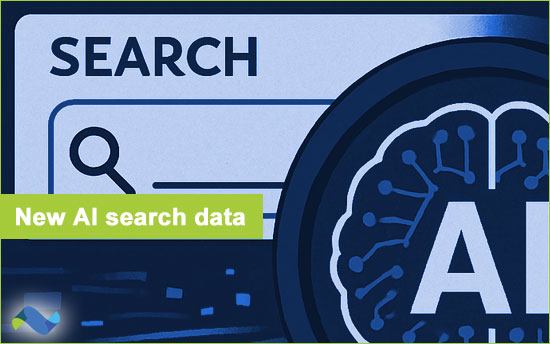LLMs & CHATBOTS
New data: AI search is taking off
The Wall Street Journal’s Patrick Coffee took a look at new data yesterday from Datos (part of Semrush) on browser-based AI search usage. Everything seems to point to a steady move away from traditional search, and also highlights how fast this trend is moving.
From the article, which reviews year-over-year growth in particular:
“The numbers are more striking among so-called early adopters, or consumers who had already started using LLMs in desktop browsers when Datos began tracking their behavior in April 2024.
Forty percent of desktop browser visits among these early adopters went to LLMs, up from just over 24% in June 2024, Datos research found. Traditional search engines’ share of the desktop browser traffic from these early adopters fell significantly in the same period, to 61% in June from around 76% a year earlier.”
But, it’s important to note Google’s response to the reporter:
“Use of Google’s traditional search product is still growing, and the AI overviews that now appear on Google searches are leading to more queries that connect consumers to businesses, a Google spokeswoman said.”
Read more on The Wall Street Journal. (July 22)
From tipsheet: Many competitors want Google to lose. But, arguably, it doesn’t seem to be showing any signs of falling behind. Nevertheless, answer engines are running wild outside of the Google sphere of control. Can multiple answer engines survive in the long run unlike Search where Google is the dominant player?
BRANDS
Adopting AI
The year-over-year adoption of AI across business-to-business verticals was the subject of a new study by LinkedIn. Perhaps surprisingly, the marketing industry’s growth was strong but lagged other verticals such as government and healthcare.
Adweek reported, “In the marketing and advertising industry, the AI-related skill that saw the most growth was AI Strategy, with a 189% adoption rate. Seeking the ability to plan and advise on AI initiatives implies members of the industry aren’t just trying to use the tools; they want to position themselves as experts.”

Read more on Adweek. (subscription)
BRANDS
The upper funnel gets AI
Opensky, which offers secured credit cards to consumers with low credit scores, is targeting the upper funnel – awareness! – according to Digiday. “Zero click” search is forcing a reconsideration of the programmatic marketer’s past, bottom-of-the-funnel strategies as search engine referrals dry up.
Read more on Digiday. (July 21)
Though AI is never mentioned explicitly, many of the tools are AI-enabled such as Quantcast’s platform for lookalike audience which uses AI for real-time audience segmentation and targeting.
CTV is identified in the article as a key strategic element for targeting the upper funnel. Many CTV platforms (The Trade Desk, Roku, Samsung Ads, etc.) now use AI for predictive capabilities around reach and creative optimization to name a few.
Finally, YouTube’s “Peak Points” ad optimization gets a mention – another AI-enabled ad format.
BRANDS
The loyal shopping agent
Tipping point? Brands need to be worried about creating loyalty with AI-powered shopping agents – so said an article in Ad Age yesterday. The reasoning here is that “AI agents prioritize efficiency over emotion” and therefore “marketers should rethink loyalty strategies using structured data, pricing and real-time” feedback.
Sounds like another version of answer engine optimization (AEO). Call it, shopping agent optimization (SAO)?
Read more. (July 22 – subscription)
More:
- How retailers can prepare for the rise of AI shopping bots (July 22) – Deloitte in The Australian
- AI Agents Are Killing Brand Loyalty And Reshaping How We Shop (July 14) – Bernard Marr on Forbes
- Podcast: What Happens to Retail Media When Agents Start Taking Over Shopping (July 22) – Next in Media
AGENCIES
IPG reports Q2 2025 results
Yesterday, in advance of its merger with Omnicom by the end of this year, agency holding company Interpublic Group reported its second quarter 2025 financial results.
AI highlights from the company’s presentation on the conference call with Wall Street analysts included:
On IPG’s AI‑powered marketing platform, IPG Interact:
“Since its launch, IPG’s Interact platform has been a key driver of our success. Interact delivers significant value by democratizing data and making AI accessible and scalable across our agencies, operation teams, brands and partners. The platform is automating complex marketing workflows and that empowers our agencies (…). All of this is in support of areas of the business that were not as far along on their data and AI journeys 12 months ago as early adopters, such as our media business.”
On employees and AI:
“… we continue to upskill our employees in using AI as a core component of their jobs…”
On creative + AI opportunity at IPG
“One [opportunity] is to enable direct client transparency and custom level control. Interact is SaaS-enabled which allows clients to access the platform as part of their engagement with our teams or to perform work directly on their own. When clients who opt into this second aspect of Interact, we now have an avenue to generate technology and software fees, not only remuneration for labor time.
The second way that AI has facilitated the integration and automation of creative has to do with optimizing workflows, eliminating gaps and speeding value to our clients.”
On agents working for the agency
“…Increasingly, we can also create and deploy teams of AI agents that learn from the functional experts across our company. Those agents work together to solve for client opportunity (…). But perhaps being missed in much of those conversations is the unlock of new opportunities for us. Those include performance-based compensation models as well as tech- enabled SaaS-like components to our compensation.”
On a new agentic commerce system
Later today, we’ll be announcing the launch of ASC which stands for agentic systems for commerce. This is a net new offering that helps CPG brands manage the vast and complex commerce ecosystem in ways that are not possible without automation and artificial intelligence.
More:
- IPG profits drop as UK growth falls 9.7% – Campaign
- Interpublic Group of Companies (IPG) Q2 2025 Earnings Call Transcript (July 22) – Seeking Alpha
- Interpublic Announces Second Quarter and First Half 2025 Results (July 22) – press release
AGENCIES
I keep getting the same pitch
Vlad Chubakov, who is Associate Director, Programmatic at performance media agency Delve Deeper, has a beef with some ad tech vendors.
He explained on LinkedIn yesterday:
“I get almost the same pitch every time. The vast majority are about inventory: curation, premium supply, SSP access, etc. Here’s something that might be eye-opening – buyers, especially at agencies, are already working with inventory providers.
So why should they start using your solution instead of Magnite, Index, or FreeWheel? All of them provide premium inventory, support, audience overlays, and etc.”
With the AI wave only gathering steam, ad tech vendors who have “AI” will also need to uniquely punch through the echo chamber.
Read more on LinkedIn. (July 22)
AGENCIES
AI’s ‘sea of sameness’
In an Inc. website opinion piece that reads like a creative agency pitch, Kean University professor Robin Landa asks SMB marketers and company founders, “Are You Sure You Want to Use AI for Marketing?”
Ms. Landa warns that AI has the potential to lead your brand to “a sea of sameness” as it tries to stand out from the competition. Quotes from R/GA APAC chief design officer Ben Miles are included such as:
“If you rely on AI to create your visual identity from scratch, it’s going to generate something average. (…) No one notices or remembers average… [Besides]… we now have the tools to create infinite variation.”
But all is not lost, AI lovers. Using AI for “distinction” rather than *just* differentiation is critical. Read what that means. (July 22)
SELL-SIDE
YouTube’s inventory is ready for AI
eMarketer Chief Content Officer Zia Daniell Wigder makes the clear case – without mentioning it by name – why Google and its AI-enabled Performance Max platform has a huge opportunity ahead due to YouTube.
Ms. Wigder wrote on LinkedIn yesterday:
“Where are US consumers spending the most time? On YouTube. They spend over 11 billion minutes on the platform everyday – that’s more than Netflix, and more than Facebook & Instagram combined.
To date, YouTube’s audience hasn’t been monetized the way Meta has monetized theirs (even Amazon is well ahead of YouTube on that front).
Indeed, at eMarketer, we have YouTube ranked as the 5th-largest platform in terms of digital ad spend in the US. When you look at ad spend vs. time spent by platform, YouTube and Netflix are always the two big outliers with high time spent and relatively low ad revenues.
Of course, it’s a different situation with Netflix given that the company has supported its content through subscriptions rather than advertising. That leaves YouTube with the most time spent, but as one of the least monetized platforms to date.
YouTube will be one to keep an eye on going forward given their low current ad revenues but massive and engaged audience.”

Read more on LinkedIn. (July 22)
SELL-SIDE
Publishing & the “human experience” product
In an article on Rebooting titled, “The OnlyFans model,” media maven Brian Morrissey took a look at the publisher state of play represented by the creator economy, OnlyFans and Substack’s recent $100 million funding.
AI has its place in publishing as Mr. Morrissey grudgingly wrote:
“The platform world inevitably will bifurcate between those that are AI-heavy and algorithmic and those that offer an alternative. Much of the discussion about AI is deterministic, as if people will not have a choice, but that’s highly unlikely. As the internet becomes filled with AI content and agents, alternatives will emerge that offer a more human experience. Substack has done a good job of maintaining that, even with uneven execution.”
Read more on The Rebooting. (July 22)
TECH
Accepting the Meta Advantage+ black box
On an episode of the “Marketing Operators” podcast published yesterday, Mobile Dev Memo analyst Eric Seufert shared insights on Meta’s advertising system and, specifically, it’s AI-enabled Advantage+ platform.
Mr. Seufert discussed frustration some marketers have due to the “black box” nature of Advantage+. Pretending to be a frustrated marketer, he began:
“I know that they could give me better performance, but I told them what my target was and they delivered on that, right? And could I have done that myself? Probably not.
And so the reality is people overestimate their abilities here. I know that [opinion] will probably catch some backlash because there is a lot of resistance to Advantage+. I would say it’s not even resistance because I think most people intuitively understand that they’re better off with it.
But, there’s some animosity towards it because [marketers] still wish there was total transparency and they wish the company wasn’t trying to maximize its own interests, but actually trying to maximize their interests like a nonprofit.
But unfortunately, that’s not the world we live in. Right? And if you look at the resources that were invested here, you just kind of have to accept it.”
Hear more on the Apple Podcasts app. (July 22)
TECH
New startup seeks to support identity amidst AI
Former Google programmatic product executive Scott Spencer teased his new startup, Rewarded Interest, in a blog post yesterday.
“Agentic AIs need identity. You may want your agent to be able to schedule a meeting with a coworker or login to restricted content. But do you want that agent to impersonate you or have its own identity? To have the same tracking preferences or different ones?
At Rewarded Interest, we believe identity is too important to be left to a browser or AI company. You need to be in control of your identity – whether it’s through your own browser or through an agentic one. We believe in a future where you own your identity.”
TECH
Contextual is new again
On the latest episode of the MarTech Podcast, Kerel Cooper, ad tech veteran and CMO at GumGum, discussed the particulars of his firm’s AI-powered contextual targeting.
He said about today’s contextual opportunity, “What’s old is definitely new again. And we seem to kind of go through these cycles in ad tech and martech every once in a while.”
Hear more from Mr. Cooper on the Apple Podcasts app. (July 22)
From tipsheet: Indeed. In the world of contextual advertising, what was “machine learning,” is now “AI.”
TECH
From traditional to AI-enabled search
Last month, Google Search rolled out a semi-regular “core” update which can affect rankings and referrals across all websites indexed by the Company. Yesterday, Search Engine Land aggregated the impact from across the SEO world and quoted website consultant Marie Haynes who said, “I believe the June 2025 Core update marks the start of some significant changes in search where Google shifts further away from using traditional ranking signals and more towards using AI to identify content that’s likely to be helpful.”
Read more on Search Engine Land (July 22).
PROMPT
How will digital advertising sell-side platforms change in 5 years?
Response from Perplexity.ai:
Overview
Digital advertising sell-side platforms (SSPs) will undergo significant transformation over the next five years, driven by advances in artificial intelligence, privacy regulations, evolving ad formats, and the convergence of traditional and digital channels. The sell-side will shift from merely facilitating programmatic transactions to becoming intelligent control centers optimizing value for publishers, advertisers, and audiences…
Read more details on tipsheet.ai.
MORE
- Google in Licensing Talks With News Groups, Following AI Rivals (July 22) – Bloomberg
- Reddit forecasts $1.8b in ad revenue as brands flock to platform’s AI tools and community model (July 18) – Mediaweek Australia
- Google Q2 earnings report is today after market close with an analyst conference call at 1:30 p PT – Alphabet Investor Relations

